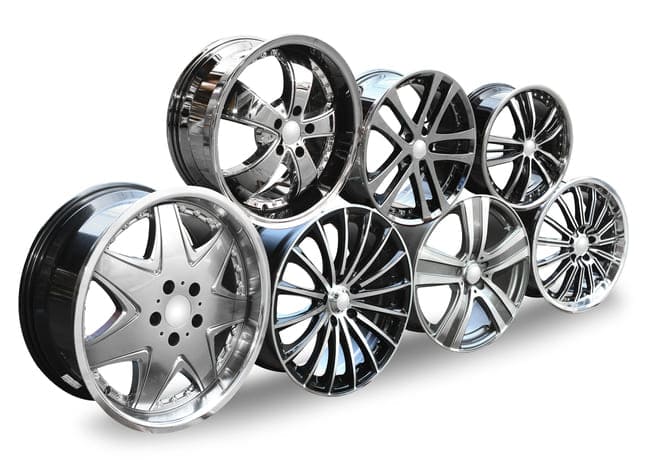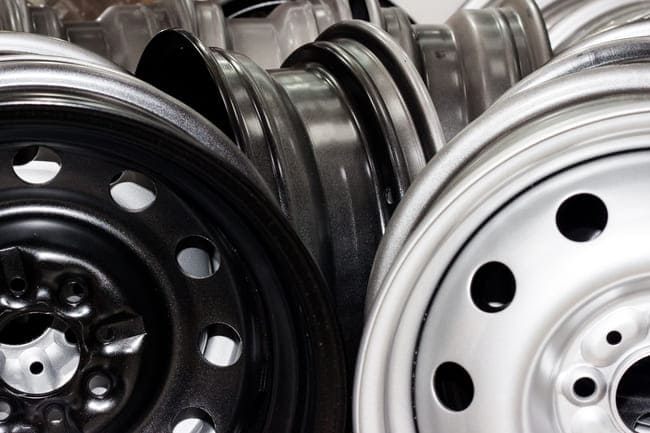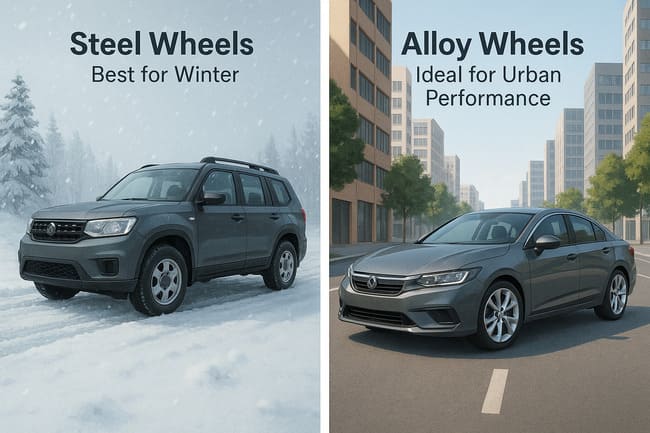Table of Contents
Alloy wheels vs steel wheels - which is better?
Choosing between alloy and steel wheels isn’t just about style. The type of wheels on your car can affect fuel efficiency, handling, ride comfort, and even long-term maintenance costs. This guide breaks down the pros and cons of each to help you make the right decision based on your driving needs, preferences, environment, and budget.
What are alloy wheels?
Alloy wheels are made from a combination of lightweight metals, typically aluminium or magnesium. Known for their sleek appearance and performance advantages, alloys are often found on sports cars and high-end vehicles. They also come in a variety of designs, making them a popular choice for drivers looking to boost their car’s aesthetics.
✅ Pros of alloy wheels
- Stylish design – available in different finishes, e.g. painted, polished, or chrome-plated designs.
- Lightweight – reduced unsprung weight improves handling, acceleration, and fuel economy.
- Performance boost – less strain on the suspension system for a smoother ride.
- Corrosion-resistant – more resilient to rust and environmental damage.

❌ Cons of alloy wheels
- Higher cost – typically 30–50% more expensive to buy and repair.
- Prone to damage – susceptible to cracks, kerb rash, and pothole impacts due to reduced flexibility.
Alloy wheels are often used with performance tyres that offer rim protection, an extra rubber lip that cushions minor impacts. This added feature is worth considering to preserve your investment in alloy wheels.
Sold by AUTODOC Sold by AUTODOC Sold by AUTODOC Sold by AUTODOC Sold by AUTODOC 




What are steel wheels?
Steel wheels are made from pressed and welded iron and carbon, making them stronger and heavier. Although they lack the flair of alloys, they’re prized for their rugged durability and affordability.
✅ Pros of steel wheels
- Budget-friendly – cost-effective to manufacture and replace.
- Durable – bends rather than cracks; easier and cheaper to repair.
- Ideal for winter – extra weight improves traction in snow and ice.
- Low maintenance – less sensitive to cosmetic damage.
❌ Cons of steel wheels
- Heavier than alloys – increases unsprung weight, which may slow acceleration and reduce the car’s cornering ability.
- Prone to corrosion – more susceptible to rust in humid or salty environments.
- Less aesthetically pleasing – typically considered more plain-looking and industrial.
If you’re not fond of the way they look, you can always enhance steel wheels with stylish car wheel covers that mimic the appearance of alloys. Just be sure to choose high-quality covers with a secure fit.

Can you replace steel wheels with alloys?
While you can often swap steel wheels for alloys, it’s not always straightforward. Steel rims are generally smaller, usually 16 inches or less, and may not fit larger brake systems found on performance vehicles, for example. Before upgrading, check your vehicle’s specifications in the car owner’s manual to ensure compatibility with the wheel wells, hubs, and car tyres.
Wheel trims
Scratched or scuffed wheel trims? No problem. There’s a wide variety of aftermarket trims available. The key is to get the right size, which is typically printed on the tyre sidewall (e.g. “R15” for 15-inch trims). If you’re looking for a specific model, such as Fiat 500 wheel trims, make sure to search using your VIN or vehicle details to ensure a precise fit.
Tyre pressure & maintenance
For any rim and tyre combination, there are recommended tyre pressures for your vehicle. Maintaining the right air pressure ensures that the weight of your vehicle is distributed evenly across the tyre’s tread. When the tyre is overinflated or underinflated, the car becomes less stable and can become very difficult to control.
This is why you should remember to regularly check your tyre pressure, as well as the condition of the tyres and valves. Using proper car tyre valve caps can prevent your tyres from leaking.
Sold by AUTODOC Sold by AUTODOC Sold by AUTODOC Sold by AUTODOC Sold by AUTODOC 




Summary: wheel comparison
Here’s a quick comparison to help you decide:
| Feature | Steel wheels | Alloy wheels |
|---|---|---|
| Cost | Low | High |
| Weight | Heavier | Lighter |
| Durability | Tough, repairable | Stylish but less durable |
| Aesthetics | Basic | Customisable and attractive |
| Ideal for | Winter/cold climates, off-roading, tight budget | Everyday driving, high-performance applications |
If you prioritise durability and cost-effectiveness over style, steel wheels are a practical choice. However, if you’re after improved handling, fuel savings, and a sleek design, alloy wheels may offer significant benefits.

How to choose rims for your car
To help you make the best choice, AUTODOC experts have compiled some tips in this handy video guide:
❓ Frequently Asked Questions
Are alloy wheels better for fuel economy?
Yes, due to their lighter weight, alloy wheels can reduce rolling resistance and improve fuel efficiency, especially in city driving conditions.
Do steel wheels affect suspension wear?
Their added weight can place more strain on suspension components over time, particularly in stop-start or rough terrain driving.
Can I use different wheel types for front and rear?
It’s technically possible but not recommended. Uneven weight and performance characteristics can affect handling, braking, and overall safety.
Top products related to this topic:










